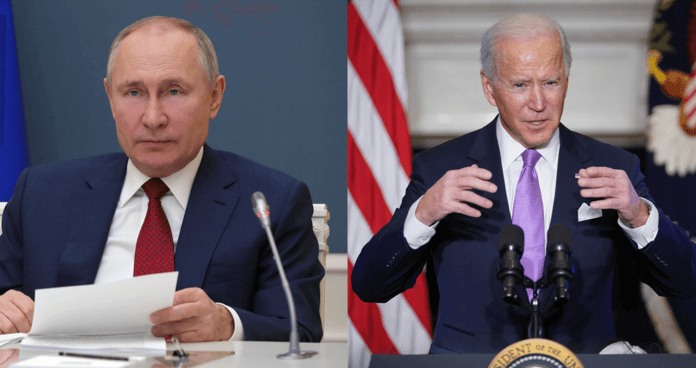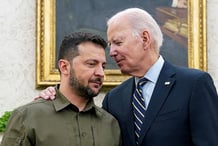
Jen Psaki’s appointment as US President Joe Biden’s press secretary was greeted in Russia with derisive comments. She was reminded of past slips of the tongue and “pearls”. But the times of the failed “reset” are already in the past and there is some irony in the fact that now Psaki is voicing the US foreign policy course, which can be called a new edition of the Cold War. And it is clearly not a reason for ridicule the recent statement of Psaki that the US administration intends to “hold Russia accountable for its reckless and hostile actions. And to this end, the president instructed the intelligence community to conduct a full assessment of cyber attacks against SolarWinds, Russia’s interference in the 2020 elections, the use of chemical weapons against opposition leader Alexei Navalny,
In this “Biden list” two items refer to the area of confrontation in the digital environment. Cyberattacks on the US digital infrastructure are the technical side of the confrontation. As for the accusations of interference in the elections, we are talking about information wars on the Internet. Thus, the “digital front” of the new edition of the Cold War becomes the main field of confrontation between the two powers. In the era of total digitalization, the Cold War is being reissued in the spirit of the times in digital format.
The tension between Russia and the United States has been growing since 2014, but in 2020 it reached a critical point, after which we can talk about an open confrontation. The trigger was a large-scale hacker attack that affected the computer systems of various departments of the US government and a number of American private corporations.
The presence of a spy “bookmark” embedded in SolarWind’s Orion program was revealed last December. In the American press, the hacker attack was rated as the most powerful in the history of the United States. According to American experts, the scale of the cyber invasion indicates that the state is behind the hackers. Colorado Congressman Jason Crowe called the attack “a cyber counterpart to the attack on Pearl Harbor.” Joe Biden put the blame for the hacker attack on Russia while still in the status of the president-elect. After taking office, Biden set about developing a response. It is clear that Moscow officially rejects all of Washington’s accusations. But this does not change the essence of the matter. There will be no new “reboot” under Joe Biden. There are more than enough “signals” on this score from overseas.
It should be noted that hacker attacks have become commonplace for a long time and cyber espionage is not new either. The news is that Russia and the United States may move to open cyberwar, which will quickly escalate into a global one. There are no familiar boundaries in the digital space. Therefore, “local” conflicts are becoming global.
Former US presidential candidate, Republican Senator Mitt Romney, in an interview with CNN, compared the destructive potential of cyberwar with nuclear. In both cases, one blow can disable infrastructure and entire cities. And in the future, cyberwar will become the main threat, Romney said.
Thus, in 2020, the beginning of an open confrontation between states in cyberspace was laid. During the last Cold War, the world was dominated by nuclear fear. Now it is being replaced by “cyber insurance”.
We are already accustomed to the fact that nuclear weapons are a deterrent. The consequences of its use are so destructive that an exchange of nuclear strikes in the modern world is considered impossible.
However, this was not always the case. At the beginning of the nuclear age, there were the bombings of Hiroshima and Nagasaki. The Soviet Union did not possess nuclear weapons until 1949. For four years, the United States was the monopoly owner of a new type of weapons. Henry Kissinger, in his book Nuclear Weapons and Foreign Policy, published in the United States in 1957, said with annoyance that the United States did not use the advantage it had over the USSR.
The likelihood of a nuclear war between the superpowers at the start of the arms race was quite real. Various scenarios for such a war were considered by both sides. This competition to gain an advantage in the arms race in order to inflict devastating damage on the enemy led to the Cuban missile crisis. By order of Nikita Khrushchev, missiles with nuclear warheads were secretly delivered to Cuba, but the Americans found them. The intention to secretly change the balance of power on the part of the USSR led to the fact that the world was on the verge of a nuclear conflict between the United States and the USSR. The war was miraculously avoided.
When Khrushchev was dismissed by his comrades-in-arms, they also recalled the adventure of delivering missiles to Cuba to him. The shock caused in the world by the Cuban missile crisis triggered the search for ways to defuse tension between the conflicting parties. Arms control treaties, non-proliferation of nuclear weapons and other international agreements were designed to deter major nuclear powers from rash moves. Now on the agenda is the extension of the START III treaty between the United States and Russia. There are no contradictions between the Joe Biden administration and the Kremlin on the issue of extending this agreement.
However, in the sphere of the use by states of cyber weapons of this level, there are no treaties, if only for the reason that the fact of carrying out cyberattacks is not recognized at the state level. Cyberattacks are still a means of covert warfare. Intelligence agencies of various countries have been spying on each other in cyberspace for several years, but the transition from covert cyber attacks and cyber espionage to open conflict between states was inevitable. The destructive potential of cyber weapons has become so great that it is no longer possible to hide a secret cyberwar. The issue of “legalizing” cyber weapons and cyberwars is on the agenda. And where there is legalization, there is regulation, the creation of legal mechanisms to control the use and development of cyber weapons.
The hacker attack on the United States hit the control systems of nuclear forces, the Ministry of Finance, the government apparatus, and large corporations. Experts have yet to establish all the consequences of the attack. From a technical point of view, the hackers worked very well, but clearly overdone it. Republican Mitt Romney said in the above interview that “Russia has a potential opportunity to paralyze our country. That is our energy, water supply, communications system. This can happen during a war. ” Romney called for a response to this invasion, including a cybernetic “similar or larger scale.”
The determined attitude of Democrats and Republicans to respond to the digital Pearl Harbor leaves no doubt that a new era in the history of war is opening – the cyber one. Joe Biden’s Administration Legalizes Secret Wars in Cyberspace. Biden announced a course to strengthen relations with NATO allies. The coalition of democracies will unite against “authoritarian regimes”. This is the ideological foundation of Cold War 2.0.
It is noteworthy that a separate area dedicated to Russia will again appear in the US National Security Council. It will be headed by former CIA employee Andrea Kendall-Taylor. She recently posted on Twitter about the release of her new book, Democracies and Authoritarian Regimes. And in the April 2020 issue of the reputable Foreign Affairs magazine, Kendall-Taylor published an article “Digital Dictators. How technology strengthens autocracies. ” The ideological contour of Cold War 2.0 is clear – digital democracies versus digital autocracies.
As at the beginning of the nuclear race, the parties to the conflict hope to inflict maximum damage on the enemy and gain an advantage. The further escalation of global cyber conflicts will show how realistic this is. However, cyber weapons are so destructive that “digital” adversaries will inevitably come to understand the unacceptability of damage and begin to search for agreements. The system of international security in the field of control over the use of cyberweapons has yet to be created. While we are at the beginning of this process. Digital Cold War 2.0 is just beginning …










